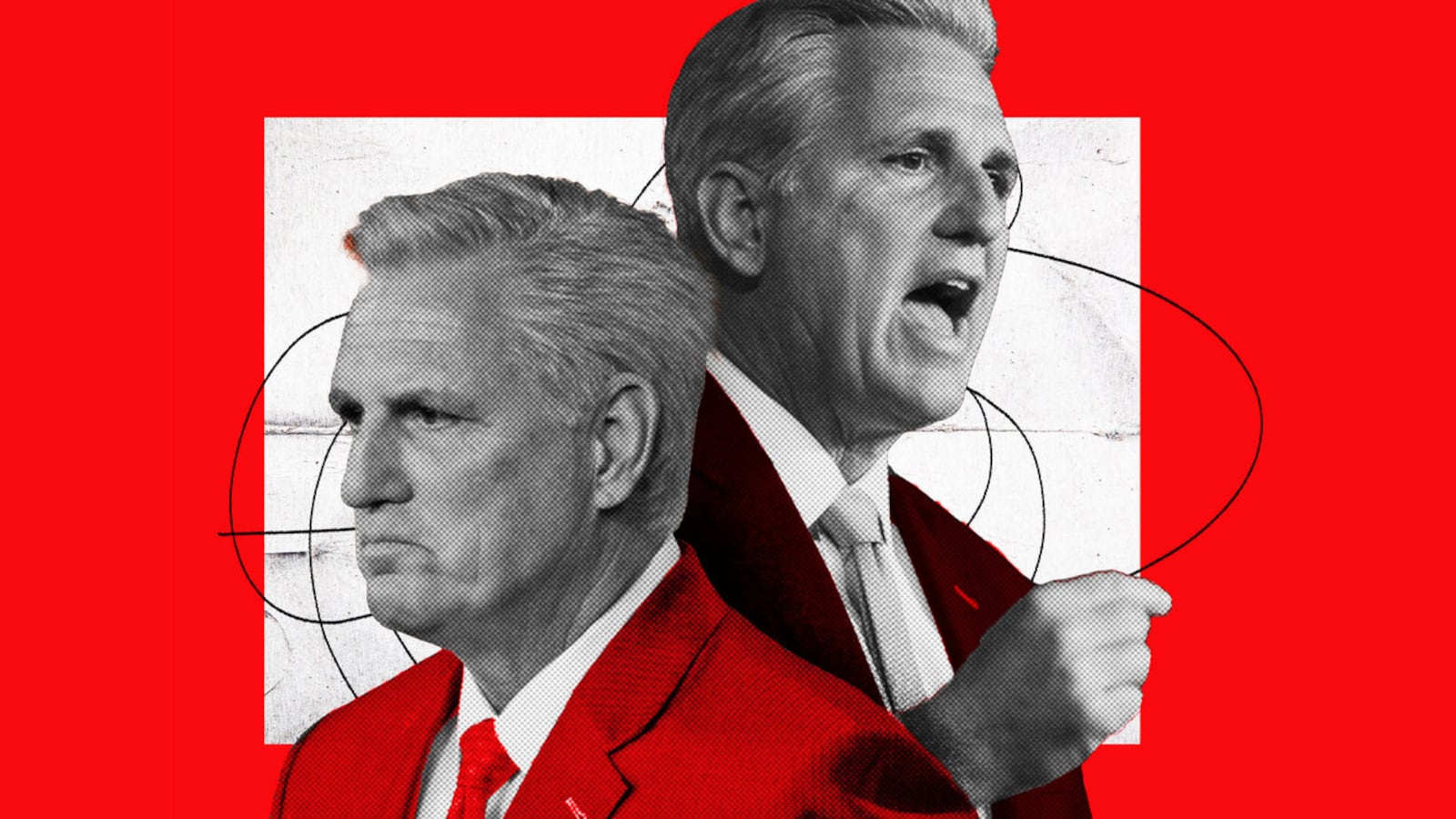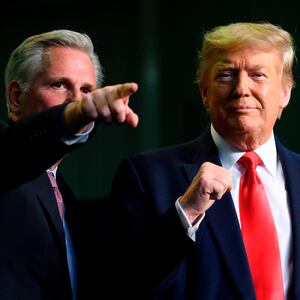With the all-important vote looming less than two weeks away, the question of whether Rep. Kevin McCarthy (R-CA) becomes Speaker of the House seems to hinge on a simple question: Who’s bluffing?
As the California Republican works to lock down the 218 votes needed to get the Speaker’s gavel, two opposing camps within the Republican conference have dug in.
The “Never Kevin” camp is small: just five archconservative lawmakers have publicly said they will not, under any circumstances, vote for McCarthy. But if they stick to their guns, five votes is all it could take to throw the process into chaos—and potentially open up an avenue for another candidate to ascend to the top job.
The much larger “Only Kevin” camp, meanwhile, has formed to head off that scenario before it even materializes. Dozens of GOP lawmakers, from moderates to MAGA loyalists, have said they will only vote for McCarthy for Speaker, no matter how many rounds of votes it takes. If followed, that commitment to respond to hardball with hardball would basically ensure no other Republican comes close to the gavel.
The emerging game of chicken is, to a large extent, about winning the run-up to Jan. 3, when the new House will convene and vote on its Speaker. Most insiders understand that if the Never Kevin camp is unable to grow its numbers by then—or put forward a true consensus candidate—their effort is doomed to fail. The threats of the Only Kevins are meant to stifle those efforts.
Each side, of course, insists they are more committed to their hand than the other.
“The people that are supportive of Kevin, which are far more numerous than his critics, are dug in at least as deep as his critics are,” said Rep. Tom Cole (R-OK), a stalwart supporter of McCarthy, in the Capitol on Thursday. “The pressure won’t be on them. It’s gonna be on the people that brought down the whole edifice—for what? For what purpose? What end?”
Minutes later, Rep. Bob Good (R-VA)—one of the five avowedly Never Kevin members—strolled through the same Capitol corridor. When told that the Only Kevin faction feels as dug in as his, he let out a laugh.
“That’s funny,” Good said. “The bottom line is, Kevin is not going to be Speaker… He’s not going to have the votes, and the number of individuals who are committed to not voting for him—it’s growing, not receding.”
The sooner Republicans “get past the denial stage” and begin considering other candidates, Good said, “the better off we’re all going to be.”
The ideal consensus candidate who could unite the warring factions of the GOP has, of course, yet to materialize. Many Republicans argue that is because such a person does not exist. Good and his allies contend several of them do, in fact, exist—though they are “publicly, of course, pledging their support to Kevin McCarthy, because they have stature in the conference.”
It would take the Never Kevin faction demonstrating their commitment, Good suggested, for alternatives to become real. “They’re for Kevin,” he said, “until they’re not.”
That McCarthy—the GOP speaker-in-waiting for years and the overwhelming choice of his current members—is continuing to struggle in his bid for the gavel is indicative, perhaps, of the relative lack of excitement he generates. That Only Kevin lawmakers were wearing buttons that simply said “O.K.” seemed to unintentionally drive the point home.
But the murky speakership race also reflects a party experiencing no small degree of angst about the direction it will take after spending four years in the minority. Many GOP lawmakers are downplaying the significance of the current leadership fight, with some calling it a healthy part of the process and arguing that past fights were far more intense.
If they are wrong, however, the consequences could be far-reaching.
The looming concern floated by the Only Kevin Republicans is that amid multiple rounds of ballots, a unified Democratic caucus could, theoretically, persuade a handful of Republicans to vote for a unity candidate instead. Names of some centrist Republicans have been floated around the Hill, like pro-Trump-impeachment Reps. John Katko (R-MI) and Fred Upton (R-NY), both of whom are slated to leave Congress after this term.
The Speaker of the House does not have to be a sitting member of Congress. That’s led to many randomly pitched candidates over the years, including former President Trump, but the prospect of a non-member Speaker mostly remains a pipedream.
Other House Republicans have employed an apparent scare tactic with their caucus, outlining the virtually impossible scenario that Never Kevin Republicans could open the door for Rep. Hakeem Jeffries (D-NY), the soon-to-be House Minority Leader, to assume the speakership. Or that Democrats could persuade a handful of Republicans to vote for a centrist Democrat, even though Democrats are in the minority.
“The real risk is if these saboteurs don't blink first and they vote for somebody who has zero chance of becoming a speaker, or vote present, then it could shift the numbers and we could have Hakeem Jeffries with the gavel. That’s a real risk,” Rep. Guy Reschenthaler (R-PA), a McCarthy ally, told The Daily Beast Thursday.
“It’s also a real risk that the more moderate Republicans team up with the Democrats and put in some, like, former Blue Dog… that’s the real risk here and I don’t think people understand just how likely that is if the five don’t get in line,” Reschenthaler added. (“Blue Dog” is a commonly used phrase to identify especially moderate Democrats.)
Cole, meanwhile, repeatedly noted that McCarthy overwhelmingly won the nomination for speaker during a closed-door party nominating vote last month. That made clear to him that the Never Kevin opposition is thin and lacks a plan.
“If you’re not going to vote for who 85 percent of the conference has already said it is—how are you going to explain that to Republican voters?” he asked. “That 85 percent of my colleagues are wrong and I’m right and I’m willing to cooperate with the Democrats on the floor to impose my opinion? They don’t have a candidate. They don’t have an alternative.”
The Never Kevin Five—Reps. Good, Matt Gaetz (R-FL), Matt Rosendale (R-MT), Andy Biggs (R-AZ), and Ralph Norman (R-SC)—insist there are more in their cohort, silently waiting to make a display of their vote on Jan. 3. Other House Republicans have openly suggested their votes are up in the air while waiting to see if McCarthy meets their demands for procedural rule changes.
Members from the House Freedom Caucus in particular have been pushing McCarthy to agree to a set of rules that would shift power away from leadership and place it in the hands of rank-and-file members. The demands range from procedural maneuvers, like allowing for more amendments, to outright giving members a mechanism to force a vote to remove a sitting speaker. Other far-right members have floated ideas like impeaching Homeland Security Secretary Alejandro Mayorkas as a sort of litmus test to see how far McCarthy is willing to go.
McCarthy has guaranteed some semblance of change in the new House. He’s promised members will have more of a say in policymaking and to ax pandemic-era practices like proxy voting, which has run rampant over the past year. But he’s largely stopped short of ensuring these Republicans the sort of sweeping change they’re asking for.
Those members are growing antsy.
Rep. Chip Roy (R-TX), for one, has been non-committal about how he’ll vote on Jan. 3. Just last month he gave a nominating speech for Biggs during the closed-door nominating contest for House Republicans, in which Biggs won 31 votes to McCarthy’s 188. Roy told The Daily Beast on Wednesday he doesn’t have any updates on how he’ll vote next month, but that deliberations are still ongoing.
“We’re still having conversations. Still a lot of issues are left unresolved and they need to be resolved,” he said.
The question of whether the publicly Never Kevin lawmakers are truly dug in—or just attempting to exact a high price for their yes votes—is one that abounds on Capitol Hill these days.
Rep. David Schweikert (R-AZ), a Freedom Caucus member who is supporting McCarthy, expects the leader to consolidate support when members actually have to vote—a scenario he says “sharpens the vision” of what any of them are trying to accomplish.
Asked if he took the Never Kevin faction’s threat seriously, Schweikert referenced an old axiom in politics.
“Remember, what was the old political saying—never take a hostage?” he said. But that’s only half of the saying. The other half—“that you’re not prepared to shoot”—Schweikert preferred to leave unsaid.










